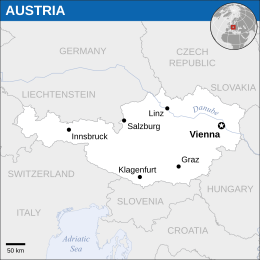More languages
More actions
| Republic of Austria Republik Österreich | |
|---|---|
 | |
| Capital and largest city | Vienna |
| Official languages | German |
| Dominant mode of production | Capitalism |
| Government | Federal parliamentary republic under a dictatorship of the bourgeoisie |
• President | Alexander Van der Bellen |
• Chancellor | Karl Nehammer |
| Area | |
• Total | 83,871 km² |
| Population | |
• 2022 estimate | 9,027,999 |
Austria, officially the Republic of Austria, is a landlocked country in Central Europe bordered by Germany, Switzerland, Liechtenstein, Italy, Slovenia, Hungary, Slovakia, and Czechia. Austria is also a member of the European Union (EU).
History
Austrian Empire
See main article: Empire of Austria (1804–1867)
Dual Monarchy
See main article: Austro-Hungarian Monarchy (1867–1918)
Cold War
After the Second World War, the Allies split Austria into multiple occupation zones but reunified it in the 1950s, unlike Germany.[1] Austria declared neutrality in 1955 and did not allow U.S. or Soviet military bases in its territory.[2]
Politics
Neo-Nazism and Holocaust denial are growing in Austria due to populist and anti-immigration rhetoric.[3]
References
- ↑ Austin Murphy (2000). The Triumph of Evil: 'A Detailed Autopsy of the Collapse of the Superior System in the Divided Germany' (p. 114). [PDF] Fucecchio: European Press Academic Publishing. ISBN 8883980026
- ↑ David Vine (2020). The United States of War: 'Normalizing Occupation' (pp. 312–3). Oakland: University of California Press. ISBN 9780520972070 [LG]
- ↑ "Austrian Neo-Nazi Party 'Becoming Legitimized' by Anti-Refugee Rhetoric" (2016-10-03). MintPress News. Archived from the original on 2022-12-06. Retrieved 2022-12-17.


